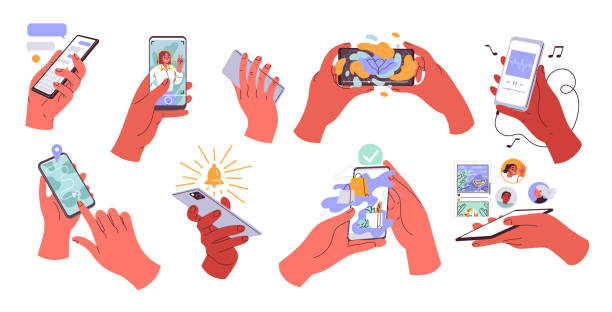In the midst of rapid technological advancements in the digital era, we are becoming increasingly connected, but often also more exposed to risks to mental health.
While technology has brought great convenience and benefits to our lives, it is important to acknowledge that excessive or inappropriate use of digital technology can have significant negative impacts on individuals’ mental health (Septiana, 2021).
There is a wealth of data discussing this issue. Among them:
- According to a report from the Anxiety and Depression Association of America (ADAA), more than 40 million adults in the United States suffer from serious anxiety disorders, which are among the most common mental health issues in the country.
- According to research published in the Journal of Abnormal Psychology, rates of depression and anxiety among teenagers and young adults in the United States have significantly increased over the past two decades, largely coinciding with increased use of social media.
- Research conducted by the National Sleep Foundation found that over 90% of teenagers and young adults report using electronic devices within one hour before bedtime, which can disrupt sleep patterns and quality of sleep.
This mental health issue is very real for humans, especially for teenagers (Gen Z), and it greatly affects the mental health of individuals, especially after the development of digital technology.
Increased Screen Time and Digital Media Consumption
One of the main impacts of technology on mental health is the increased screen time and digital media consumption.
The more time we spend in front of screens, especially on devices like smartphones and computers, the greater the risk of experiencing mental health problems such as anxiety, stress, and depression.
Research has shown that excessive exposure to social media and certain digital content can lead to feelings of helplessness, detrimental social comparisons, and isolation (Fitri Wahyu Rahmadania et al., 2023).
Social Media Pressure and Mental Health
While social media provides a platform for interaction and sharing, it can also be a source of pressure and anxiety. The pressure to present a “perfect” version of ourselves online can lead to unhealthy pressure and feelings of inadequacy. Additionally, phenomena such as cyberbullying can have serious impacts on individual mental health, especially among teenagers and young people (Sudrajat, 2020).
Baca Juga: The Influence of Globalization on Indonesian Traditional Art
Sleep Disturbance and Work-Life Balance
Increased use of digital technology can also disrupt sleep patterns and the balance between personal and professional life. Constant notifications from smartphones and other devices can disrupt sleep and hinder adequate rest.
Additionally, the expectation to always be connected and responsive can lead to additional pressure and make it difficult to limit work and rest time.
Solutions and Healthy Approaches
Despite the risks to mental health, technology also offers solutions to support mental well-being. Mental health apps, online therapy, and health tracking tools such as sleep apps and mood trackers can help individuals manage and monitor their mental health.
Additionally, it is important to practice healthy technology use habits, such as setting screen time limits, participating in outdoor activities, and creating time for rest and rejuvenation (Nurhakim & Asbari, 2023).
In addition, there are other solutions that can be considered to support mental health in the digital age:
1. Practice Mindfulness and Meditation
Engaging in mindfulness and meditation exercises regularly can help reduce stress, anxiety, and improve overall mental well-being. There are many apps and online resources that can help individuals start this practice.
2. Stay Physically Active
Regular exercise is not only good for physical health but also has positive effects on mental health. Walking, running, yoga, or other physical activities can help reduce stress and improve mood.
3. Contribute to Positive Online Communities
Choose to engage in online communities that support, motivate, and promote positive mental health. Participating in forums or groups that offer support and understanding can help reduce feelings of isolation and improve social connections.
4. Take Breaks from Technology
Take time to take breaks from technology regularly. Engaging in outdoor activities, reading books, or interacting directly with others without relying on electronic devices can help alleviate stress and improve well-being.
5. Share Experiences and Talk to Others
Do not hesitate to talk to close people about your feelings. Sharing experiences and burdens with others can provide much-needed emotional support and help reduce the pressure you feel.
Baca Juga: Causes of Low Education Quality in Indonesia
By integrating these solutions into daily routines, individuals can strengthen protection against the negative impacts of technology on their mental health and improve overall quality of life (Ardhiyansyah et al., 2023).
In facing the impact of technology on mental health in the digital era, it is important for individuals to understand the risks involved and take steps to protect their mental health.
This involves awareness of technology usage patterns, setting healthy screen time limits, and seeking professional help when needed. With a balanced and responsible approach to technology use, we can harness it as a tool to improve mental health and well-being.
Penulis: Adiska Maryam Rahmawati
Mahasiswa Pendidikan Bahasa Arab Universitas Muhammadiyah Prof. Dr. Hamka
Editor: Ika Ayuni Lestari
Bahasa: Rahmat Al Kafi
Ikuti berita terbaru di Google News
References
Ardhiyansyah, A., Bakker, C., & Sijabat, S. G. (2023). Dampak Teknologi Digital terhadap Kesejahteraan Mental: Tinjauan Interaksi, Tantangan, dan Solusi. Jurnal Psikologi Dan Konseling West Science, 1(04), 181–188.
Fitri Wahyu Rahmadania, Fransiska, & Kukuh Laksono. (2023). Dampak Literasi Digital Instagram @mudahbergaul tentang Kesehatan Mental terhadap Kesadaran Masyarakat. MUKASI: Jurnal Ilmu Komunikasi, 2(4), 287–296. https://doi.org/10.54259/mukasi.v2i4.2405
Nurhakim, M. I., & Asbari, M. (2023). Digital Minimalism: Filosofi Efisiensi Penggunaan Teknologi Digital. Literaksi: Jurnal Manajemen Pendidikan, 1(2), 49–54. https://doi.org/10.30596/jimb.v22i1.4888
Sudrajat, A. (2020). Apakah Media Sosial Buruk untuk Kesehatan Mental dan Kesejahteraan? Kajian Perspektif Remaja. Jurnal Tinta, 2(1), 41–52. https://doi.org/10.35897/jurnaltinta.v2i1.274













